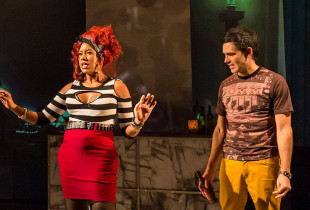2015/16 L.A. Writers’ Workshop Culminates in a Circus of Ideas and Stories


Storytelling. Heat. Passion. Coffee. These were the sounds, smells, and feelings in Rehearsal Room C in The Music Center Annex over a weekend in early June, at the culminating retreat of the L.A. Writers’ Workshop. Each year, Center Theatre Group supports a small group of local playwrights as they research and write a new work while receiving feedback from their fellow writers and our staff. The group of playwrights up for this year’s challenge included Martín Zimmerman, Sylvan Oswald, Janine Nabers, Tom Jacobson, Allison Moore, Daria Polatin, and Charise Castro Smith.
The program kicks off with a salon in the fall where playwrights interview community members who have expertise in their plays’ subject matter and concludes in this two-day retreat where a diverse company of actors reads the playwrights’ first drafts.
Joy Meads, Center Theatre Group’s Literary Manager, was the ringleader in this circus of new ideas, point of views, and stories demanding to be told. She encouraged a spirit of support for playwrights she frequently described as “brave, bold, and generous.” There was a deep sense of trust in not only the stories but also in the actors, playwrights, and staff members who were open to hearing them.
Day one of the retreat featured three plays read by what can only be described as a pack of fearless actors. The writers worked tirelessly up until the last moment making edits and rewrites, sometimes seconds before the beginning of a reading, pens ablaze. The actors took the changes in stride, providing breadth and depth despite the fact that they had gotten the meticulously crafted material on such short notice. The cold readings were “exhilarating,” said actor Herbert Siguenza, a member of Culture Clash most recently seen at the Kirk Douglas Theatre in Chavez Ravine, “because of the unknown and blind curves that come at you as an actor trying to convey and tell the story for the first time.” Siguenza and his fellow actors handled these curves professionally, allowing the work to inform them and in the process help the playwrights inform their pieces.
The first play of the weekend was the story of how a woman’s academic research collides with her personal life as she tries to uncover her father’s traumatic past, and in turn becomes her own cognitive behavioral case study. Another piece later in the day was an unfinished work featuring a kaleidoscopic and experimental group of vignettes that employed exile as a lens through which to explore longing, desire, loneliness, and fear. In the discussion afterward, a question from the playwright about the piece’s structure provoked a conversation about the way his journey creating it might mirror the action of the story. This discussion and others added new depth to the pieces and created an atmosphere of discovery for the playwrights.
“It was an extra lovely treat to engage with playwrights who were so open to catching a creative spark from all of the insightful and intelligent feedback,” said actor Sameerah Luquaam-Harris, who was recently seen at the Mark Taper Forum as Penny in Father Comes Home From The Wars.
The last play of the day was a comedy about former child television stars dealing with the aftermath of scandal and fame. All three of Saturday’s readings left the group reflecting on the question of how time changes us, shapes us, scares us, and scars us, and how pain can be passed down from generation to generation.
Day two opened with a story of race and power, set in a mid-century Los Angeles spa, and featuring characters dealing with what it means to be branded or marked. Rounding out the weekend—appropriately—was a play about a woman who becomes an unwilling participant in a performance artist’s project, which destabilizes her image of herself and her sense of sexuality and womanhood. The post-reading discussion touched on the purpose of art and how we measure it: is art here to make money or influence minds? Where is the boundary between entertainment and provocation, and how far can an artist cross the line while still engaging her audience? It was an appropriate way to encompass all of the art and ideas that had been bouncing off the walls of Rehearsal Room C for two days.
The weekend offered playwrights and actors alike a peek into each other’s craft and process. I think I can speak for everyone when I say that the plays produced in the L.A. Writers’ Workshop beg to be onstage and hopefully will be in the coming years.
Related Articles
L.A. Writers' Workshop
The L.A. Writers' Workshop invites seven local playwrights to spend a year researching and writing a new work while receiving feedback from their fellow writers and Center Theatre Group staff.
Learn More